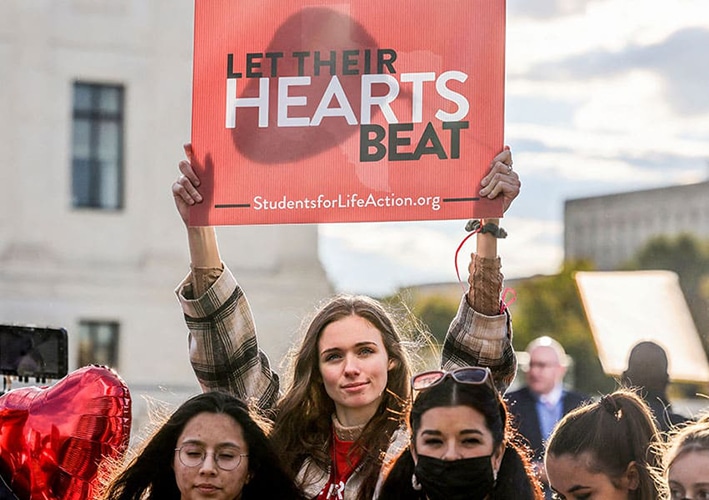
No-one ever thought Roe v. Wade would be overturned. Then it was. There’s a lesson in that.
The US Supreme Court decision in June overturning Roe v Wade came as a shock to supporters of abortion around the world. Also jolted were those who embrace the bigger secularist picture of how the world should be, which sees abortion basically as a good and necessary thing. A decision like this was always going to be big news of course, but it is interesting to reflect on the disbelief that accompanied the reaction.
The Supreme Court created a constitutional right to abortion in the United States in its 1973 Roe decision. Roe was contentious from the beginning, and from the beginning there have been calls for it to be overturned. President Trump’s appointments to the bench were seen as increasing the likelihood of this happening. Earlier this year a draft of the court’s decision in Dobbs v Jackson Women’s Health was leaked, setting protests raging. Despite all this, the decision landed like a bombshell. It was something that was just not meant to happen.
Keep in mind that Dobbs did not make abortion in the United States illegal. It overturned the earlier Roe decision which made it a constitutional right. It did not do this arbitrarily, but from a meticulous re-examination of whether Roe properly met the requirements of American constitutional law. The effect of Dobbs is to return the issue of abortion to the democratic process in each of the 50 states.
This will see some places restrict it and some places enshrine it, according to the convictions of their voters. Underlying the shock and disbelief at the decision is a particular idea of the future. This idea sees the legitimation and normalisation of things like abortion as a destiny; as something which is inevitable, despite struggles and setbacks along the way, as humanity becomes more secular and humane, and less religious and intolerant.
This is the way many people would explain the relentless displacement of many long-established moral understandings based on Christianity in our society over the last 60 years. It is an idea of the future as a long winding funnel: ceaseless movement around twists and turns combined with the inevitability that we will all end up at the same place.
It is meant to be a better place, a radiant future of equality, compassion and freedom. There is no going back to the dark past of privilege, cruelty and control from here, and of course no thoughtful, caring human being would want to go back.
Abortion is just one of a number of contentious issues which play out along this story line. There are a couple of contradictory variations on the plot. There is the struggle scenario: while the outcome is inevitable, fear, ignorance and intolerance (that is, people who do not buy the secularist package) constantly threaten to drag us back to the terrible times from which we have only recently escaped.
Then there is the breakthrough scenario: once something like abortion has been made a right, once the breakthrough has been made, there can be no going back to how things were before.
Dobbs has quite upset this narrative. It is not about going back. It is a powerful reminder that the future is open, that bad things in society can be changed, even when they have been entrenched and protected for half a century. The future is not a funnel to a secular utopia, but a great open forest, full of possibilities, “beautiful, dark and deep”. We do not know what is in the forest. It might be a jungle or it might be a sanctuary. In reality, there are many possibilities for both. It depends on what we choose to make it.
Democracy is the way we choose. It remains the best imperfect means we have for dealing with disagreement. What to do about issues like abortion should be decided democratically, not by experts, even if the decisions made are not those we support. Parliaments in Australia have made bad decisions on abortion and euthanasia and religion in recent years. However nothing in democracy is ever really settled, which means we can keep making the case for a better, more life-giving way.
Arguments and evidence are part of this, but the most important evidence lies in showing how we care for people affected by these issues.
Religious arguments against abortion come from the same conviction that drives us to care for those who are poor, or homeless, or sick, or refugees: we are all creatures made in the image and likeness of God. Religious arguments, however, are not necessary. It is enough to follow what science tells us about when human life begins, and the basic requirement of justice to protect innocent human life.
We are quite good at denying reality, but with perseverance it eventually cuts through. This is the vocation of Christians in public life: perseverance in persuasion and witness, especially when it seems to be in vain.
Related:
US Church braces for Roe v Wade fallout
Michael Casey: Rehumanising our institutions
